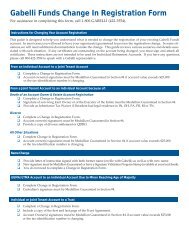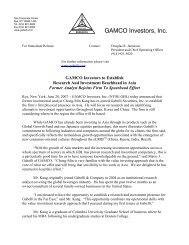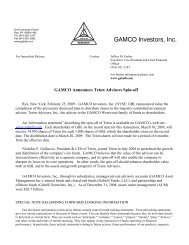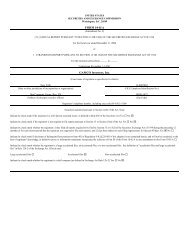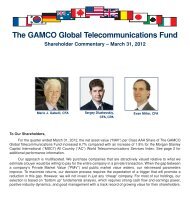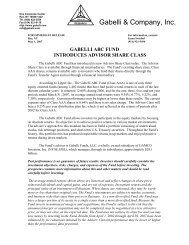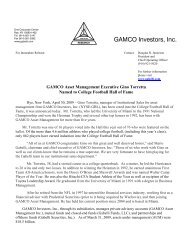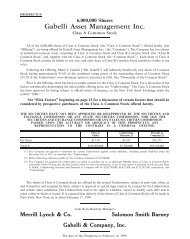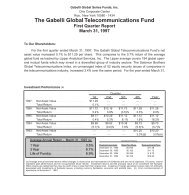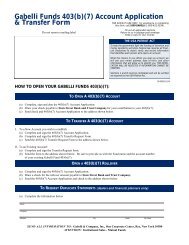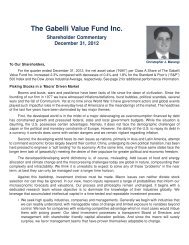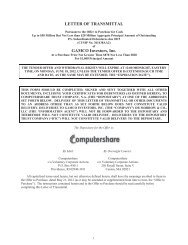Statement of Additional Info - Gabelli
Statement of Additional Info - Gabelli
Statement of Additional Info - Gabelli
You also want an ePaper? Increase the reach of your titles
YUMPU automatically turns print PDFs into web optimized ePapers that Google loves.
Portfolio Manager’s decision as to the selection <strong>of</strong> brokers and dealers could yield disproportionate costs and benefits<br />
among the funds or other accounts that the Adviser and its affiliates manage. In addition, with respect to certain types <strong>of</strong><br />
accounts (such as pooled investment vehicles and other accounts managed for organizations and individuals) the Adviser<br />
may be limited by the client concerning the selection <strong>of</strong> brokers or may be instructed to direct trades to particular brokers.<br />
In these cases, the Adviser or its affiliates may place separate, non-simultaneous transactions in the same security for a<br />
Fund and another account that may temporarily affect the market price <strong>of</strong> the security or the execution <strong>of</strong> the transaction,<br />
or both, to the detriment <strong>of</strong> such Fund or the other accounts. Because <strong>of</strong> Mr. <strong>Gabelli</strong>’s position with the affiliated brokerdealer<br />
and his indirect ownership interest in the affiliated broker-dealer, he may have an incentive to use the affiliated<br />
broker-dealer to execute portfolio transactions for a Fund.<br />
Variation in Compensation. A conflict <strong>of</strong> interest may arise where the financial or other benefits available to a Portfolio<br />
Manager differ among the accounts that he/she manage. If the structure <strong>of</strong> the Adviser’s, or Sub-Adviser’s management<br />
fee or the Portfolio Manager’s compensation differs among accounts (such as where certain accounts pay higher<br />
management fees or performance-based management fees), the Portfolio Managers may be motivated to favor certain<br />
accounts over others. The Portfolio Managers also may be motivated to favor accounts in which they have investment<br />
interests, or in which the Adviser, Sub-Adviser, or their affiliates have investment interests. Similarly, the desire to<br />
maintain assets under management or to enhance a Portfolio Manager’s performance record or to derive other rewards,<br />
financial or otherwise, could influence the Portfolio Manager in affording preferential treatment to those accounts that<br />
could most significantly benefit the Portfolio Manager. For example, as reflected above, if a Portfolio Manager manages<br />
accounts which have performance fee arrangements, certain portions <strong>of</strong> his/her compensation will depend on the<br />
achievement <strong>of</strong> performance milestones on those accounts. The Portfolio Manager could be incented to afford<br />
preferential treatment to those accounts and thereby be subject to a potential conflict <strong>of</strong> interest.<br />
The Adviser, the Sub-Adviser, and the Funds have adopted compliance policies and procedures that are reasonably<br />
designed to address the various conflicts <strong>of</strong> interest that may arise for the Adviser, the Sub-Adviser, and their staff<br />
members. However, there is no guarantee that such policies and procedures will be able to detect and prevent every<br />
situation in which an actual or potential conflict may arise.<br />
Compensation Structure for Portfolio Managers <strong>of</strong> the Adviser other than Mario J. <strong>Gabelli</strong><br />
The compensation <strong>of</strong> the Portfolio Managers for the Funds is structured to enable the Adviser to attract and retain highly<br />
qualified pr<strong>of</strong>essionals in a competitive environment. The Portfolio Managers receive a compensation package that<br />
includes a minimum draw or base salary, equity-based incentive compensation via awards <strong>of</strong> stock options or restricted<br />
stock, and incentive-based variable compensation based on a percentage <strong>of</strong> net revenue received by the Adviser for<br />
managing a Fund to the extent that the amount exceeds a minimum level <strong>of</strong> compensation. Net revenues are determined<br />
by deducting from gross investment management fees certain <strong>of</strong> the firm’s expenses (other than the respective Portfolio<br />
Manager’s compensation) allocable to the respective Fund (the incentive-based variable compensation for managing<br />
other accounts is also based on a percentage <strong>of</strong> net revenues to the investment adviser for managing the account). This<br />
method <strong>of</strong> compensation is based on the premise that superior long term performance in managing a portfolio should be<br />
rewarded with higher compensation as a result <strong>of</strong> growth <strong>of</strong> assets through appreciation and net investment activity. The<br />
level <strong>of</strong> equity-based incentive and incentive-based variable compensation is based on an evaluation by the Adviser’s<br />
parent, GBL, <strong>of</strong> quantitative and qualitative performance evaluation criteria. This evaluation takes into account, in a<br />
broad sense, the performance <strong>of</strong> the accounts managed by the Portfolio Manager, but the level <strong>of</strong> compensation is not<br />
determined with specific reference to the performance <strong>of</strong> any account against any specific benchmark. Generally, greater<br />
consideration is given to the performance <strong>of</strong> larger accounts and to longer term performance over smaller accounts and<br />
short term performance.<br />
Compensation Structure for Mario J. <strong>Gabelli</strong><br />
Mr. <strong>Gabelli</strong> received incentive-based variable compensation based on a percentage <strong>of</strong> net revenues received by the<br />
Adviser for managing the Mighty Mites Fund. Net revenues are determined by deducting from gross investment<br />
management fees the firm’s expenses (other than Mr. <strong>Gabelli</strong>’s compensation) allocable to this Fund. <strong>Additional</strong>ly, he<br />
receives similar incentive-based variable compensation for managing other accounts within the firm and its affiliates.<br />
This method <strong>of</strong> compensation is based on the premise that superior long term performance in managing a portfolio should<br />
be rewarded with higher compensation as a result <strong>of</strong> growth <strong>of</strong> assets through appreciation and net investment activity.<br />
The level <strong>of</strong> compensation is not determined with specific reference to the performance <strong>of</strong> any account against any<br />
specific benchmark. One <strong>of</strong> the other registered investment companies managed by Mr. <strong>Gabelli</strong> has a performance<br />
(fulcrum) fee arrangement for which his compensation is adjusted up or down based on the performance <strong>of</strong> the<br />
57




